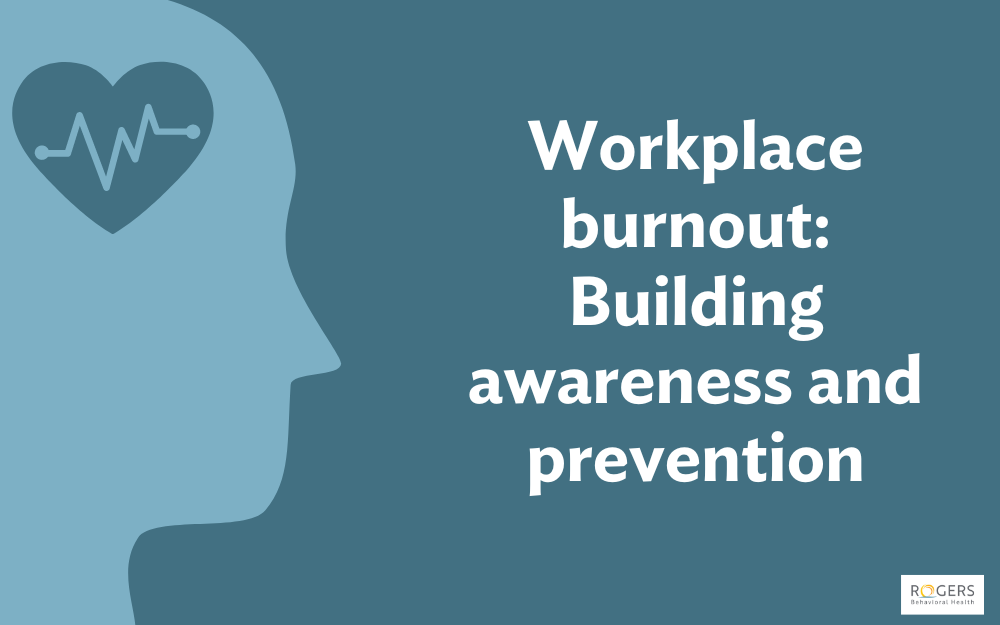
Workplace burnout: Building awareness and prevention
05/22/24 01:00:pm
Every day, we help our patients and residents rise above the challenges of mental illness to lead healthy lives and rediscover hope. But that work comes with struggles of its own, including the possibility of compassion fatigue, a type of burnout that can result from helping others. We talked with Dr. Jerry Halverson, MD, FACPsych, DFAPA, and Emily Jonesburg, MSW, LCSW, program manager, Rogers Community Learning and Engagement and WISE, about workplace burnout and ways to prevent it.
What is workplace burnout?
Dr. Halverson: “Burnout” can be a negative term because it feels like the person who is burned out is at fault, or that the individual is doing something wrong. The focus is often on helping the person feeling burnout behave differently, when typically, burnout is caused by a variety of factors in the workplace over which the person has no control. I would define burnout as increased irritability and apathy toward what a person does, which causes the individual to be less engaged, less effective, and experience less enjoyment or job satisfaction. A person may take longer than usual to get things done at work, and overall, may feel less tolerant of the workplace.
Emily: Often, it’s a state of being or feeling depleted. Someone experiencing workplace burnout has a hard time accessing innovative thinking and typically isolates from their peers. A person may feel fatigue, a greater sense of hopelessness, helplessness, sadness, and an inability to be as empathetic and compassionate to others as they normally would be. They’re spending a lot of time and energy dwelling on negative or stressful events from the day and aren’t finding joy in their work.
People use the term “burned out” in different ways. Someone could say, “I feel incredibly burned out from this day” and that’s not to minimize their experience. They probably had a very challenging day and truly do feel drained. What we’re talking about is longer lasting. It’s when you repeatedly feel drained at work and aren’t tending to your needs.
One thing we talk about in our compassion resilience work is the compassion fatigue cycle. The last stage is the zombie stage. A person can’t see all the support around them and may feel like they’re the only one who can do certain tasks, like care for a patient, run a committee, or whatever it may be because they’re focused on just getting through the day and putting one foot in front of the other.
What causes workplace burnout?
Dr. Halverson: Burnout can be caused by many workplace factors and the interplay between them and the individual feeling burnout, personal factors, and experiences. For example, in the medical field, all the time we spend with electronic medical records is thought to have really driven a lot of the burnout, because when we have to be on our computers so much, we’re not able to interact with our patients as much as we would like.
Emily: When people feel disconnected from their why, as in why they got in their line of work, they can begin the process of feeling burned out. It’s gradual. A person gets more and more disconnected and loses sight of living in their why and their values. “Moral injury” contributes to burnout and refers to when people have to make decisions or do things that go against their personal ethics or their morals. The example given in the medical field is when doctors have to make decisions based off insurance reimbursement rates, regardless of what’s best for the patient, or they’re told they need to turn through patients in 15-minute periods, and that’s against why they went into the field.
Another contributing factor is experiences of oppression and micro-aggressions. As I’m sure you can imagine, if you’re working in an environment that doesn’t support, or worse, is hostile toward a component of your identity, that’s going to amplify feelings of fatigue and burnout. If someone is already carrying the stressors associated with working in a helping profession with colleagues who are also drained and patients who have high rates of trauma, and on top of that, their opinion isn’t valued, they are continuously talked over, their name isn’t pronounced properly, and pronouns aren’t honored, they will most likely get to a state of burnout even faster.
Are some jobs more prone to workplace burnout?
Dr. Halverson: Physicians, nurses, and other healthcare professionals are at higher risk for burnout, which not only impacts the care they give to patients, but also affects the team of people surrounding them.
Emily: Helping professions are found to have higher rates of burnout because people are emptying their cups frequently to support other people. There’s been a big move to be trauma-informed, which is amazing and incredibly needed to provide services to meet people where they are and be sensitive to all the things that people bring with them into a space. At times when we’re being trauma informed, if we’re not being mindful of how we tend to ourselves, we can be open to all of the tough stuff that someone brings with them. As a result, we can experience and internalize certain levels of trauma. Holding that in your body impacts your sense of well-being and leads to a higher rate of burnout.
Why does workplace burnout matter?
Dr. Halverson: Besides affecting how people do their jobs, burnout impacts how people relate at home and perform in other things they do outside of work. People who feel burned out are less effective and less happy with everything that they’re doing. Burnout can lead to depression, and in severe cases, suicidal ideation.
Emily: Burned-out staff can lead to an increased likelihood of complaints and incidents within a workplace environment because they may not be as attentive to other people’s needs and not as observant because they’re drained. They’re much more likely to respond in ways that aren’t as warm and compassionate as they should be. They’re also much more likely to leave the workplace.
We’ve also found in our work with compassion resilience that if you have team members who are experiencing feelings of burnout, or compassion fatigue, it’s much more challenging to be in that work environment and remain in a place of balance and compassion resilience. We can all empathize with that. When you’re surrounded by colleagues who are super drained, it negatively impacts the morale of the entire group.
Even if burned out employees don’t leave, they will be less productive, less likely to meet the company’s metrics, and as mentioned before, less likely to be contributing creatively to initiatives.
What should I do if I’m feeling burned out?
Dr. Halverson: The first step is to identify what you’re feeling. Just like with people struggling with depression, a person experiencing burnout is usually the last one to recognize it. Pay attention to comments friends and family members are making. If you’re able to, take time away from work. Sometimes burnout can be taken care of by a well-placed vacation, a long weekend, or a day off. Since taking time off may not always be possible, find time to engage in enjoyable activities. Maybe that’s walking the dog outside on a nice day for a little bit longer period of time, reading a book for a while, allowing yourself an extra couple of hours to sleep at night. Pleasurable activities, even doing small things, help recharge and replenish us. Not everyone knows what they enjoy or takes the time to think about self-care or develop hobbies. If that’s you, then experiment. Try doing what other people think is fun. That’s behavioral activation. When our patients are depressed, we help them figure out what they enjoy doing then ask them to do it. People find that helpful.
Emily: It’s important to identify the things that are contributing to feelings of fatigue or burnout. On the flip side, think of what helps you feel resilient and filled up. We do an exercise in compassionate resilience where we support people in identifying those pieces, then have them think about their locus of control. If you think about those two lists, which things do you think you have control of, and of those things, what can you do to minimize what’s driving your fatigue, or do more of the things that are building your resilience? For the things that you don’t have control over, how can you minimize the amount of time and energy you’re putting toward them? At the end of the day, you can spend time thinking about, strategizing, and stressing over them and they’re still going to be there. Unfortunately, you’ll be just that much more depleted. A perspective shift can be really powerful and helpful.
If you are finding that systemic issues at work are contributing to your feelings of burnout, consider finding allies within your team or in other departments to express concerns. You may be in a position where for your well-being, you need something to be different. While not everything that causes one’s sense of burnout can be changed, some things can. With the support of a supervisor, together you may be able to identify ways to eliminate or minimize those things that contribute to your sense of burnout.
Register for a Compassion Resilience series
Learn more here about how to register for an 8-session compassion resilience series from our Community Learning and Engagement team starting in June.





